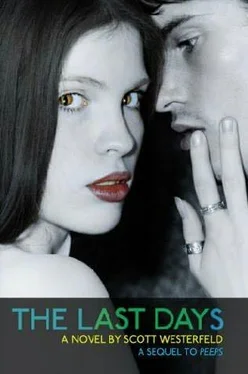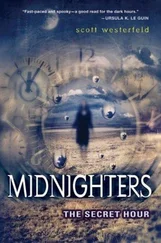“Don’t worry,” I said, tapping my forehead. “They’ll come.”
By ten P.M. the wind had grown stronger, cutting slices of cold salt air from the East River.
The angels had disappeared, hidden among the trees and up in the light towers, perched across the arched top of the amphitheater—watching over us, just like at the nightclub. Ready to descend.
And hopefully to protect us, if this all went horribly wrong.
Pearl switched on her mixing board, and the columns of speakers began to buzz. She gave Zahler a low E and he tuned his bass, the stage rumbling beneath me. Moz and Minerva came out of the shadows to take their places, trembling in the cold.
We waited for a moment, looking at one another. Pearl had finally come up with the perfect name for us, but there was no one to announce it.
So we just started playing.
This time Zahler didn’t freeze. He began the Big Riff, the bass notes thundering out across the park, bouncing lazily back from the wall of housing projects along Manhattan’s edge. The rest of the lights came up, bright white instead of the colored gels we were used to, as harsh as a movie set. We were blinded now to anything out there in the darkness, terrifyingly exposed. We had only our angels to trust in.
It was Moz who froze this time, his body shuddering for a long moment as he fought the anathema of his own music. But finally his fingers danced into motion on the strings, years of practice beating aside the parasite inside him.
I started drumming, muscles falling into familiar patterns, but the motion of my hands didn’t calm me. It wasn’t the blank and empty darkness before me, or the thousands of deadly, infected maniacs all around us. It wasn’t even the thought of those huge, human-eating creatures we were trying to summon.
What scared me was being drawn again into the engine of our music. I remembered playing, unable to stop, while the worm had rampaged through the crowd, cutting them down while they watched us, mesmerized. My moral hazard still lurked in the corners of my vision, watching me and waiting.
If the world wasn’t cured soon, that vision would become too real. I was running out of pills, the last bottle shaking half empty in my pocket, more depleted every day. I wasn’t being heroic, risking my life here on the cold edge of Manhattan. I was being logical.
I was one of those people who needed civilization simply to survive.
Minerva began to sing, her voice searching the darkness, keening through the empty and weed-choked park around us. Calling.
The air began to glisten, and soon I could see the music: Moz’s notes hovering in the air, Pearl’s piercing melody like a thin spotlight moving among them, making them sparkle. Minerva’s song wound through it all, stretching out into the darkness, and Zahler and I played with a fierce determination, as tight as fingers locked together, like sentries afraid to turn their heads.
We played the whole piece through, hoping someone would hear.
When we reached the end, no cheers or applause answered us, not even a lonely shout of encouragement. No one had come.
Then the lights faded around us, and I looked out at where the audience should have been.
A galaxy of eyes reflected back at me. Night-seeing eyes.
Peeps.
They stared at us, transfixed, undead. Not like the angels or Minerva or even trembling Moz, not sane or reasonable or human. These had been fully taken by the disease. They wore filthy and tattered clothes, logos ripped from them as the anathema had taken hold. Many were barely covered, shivering in ragged pajamas and sweat-pants—the sort of clothes you’d wear to bed when you felt feverish and half-crazy, coming down hard with the flu. Their fingernails were long and shone black, as if they’d glued the husks of dead beetles to their fingers. A hundred of them stood there. Motionless.
The survivors hadn’t gathered to hear us. The vampires had.
Astor Michaels had been all too right. Our real audience had found us by smell.
“Oh, crap,” Zahler said next to me.
A stir moved through them, forms shifting in the silence, the spell of the song fading. Glimmers of hunger flashed in their eyes.
“We have to keep playing,” I said.
“We have to run ,” Zahler hissed. He started to back away.
The crowd stirred again. One of them was shambling toward the stage, squinting his eyes against the light.
“Zahler, stop,” Moz said. “It’s like your dogs. Don’t show them you’re afraid.”
“My dogs don’t eat people !”
I heard more sounds in the darkness behind us. Of course, the peeps weren’t just in the audience in front of us. They were all around us…
“Alana Ray’s right. We need to keep playing,” Minerva said. “We don’t want to disappoint the fans.” She pulled the microphone to her lips and began to hum.
The eerie melody crept from the amps, a nameless, shapeless tune that we’d made into our slowest song: “A Million Stimuli to Go.”
The peeps began to settle down.
Pearl joined Minerva, her fingers spreading across her keyboards to hold down long, lush chords. Then Moz came in on top, quick notes flirting with Minerva’s hummed melody, pushing her toward words.
I began to play, rolling the sticks softly across my paint buckets, breaking into a slow beat. Finally Zahler reluctantly joined us, his bass rumbling through the darkness.
The peeps remained motionless, staring at us, unblinking.
We played the whole song, trying to forget our ghastly audience, but we wound up going faster toward the finish, our fear finally showing in the music. We ended with a brutal thrashing of the same chord again and again, finally rattling into silence.
I looked out into the dark.
There were five times as many of them now.
“Spot the problem,” Zahler said.
A ripple went through the ragged army before us. One of them let out a low, hungry moan. A drop of sweat crawled down my back, as cold as the night air.
“We can’t stop playing!” I said.
“What?” Zahler hissed. “You want more of them to come?”
Moz took a step back, his hands quivering. “Yeah, and what if no worm ever shows up?”
“Boys,” Minerva said straight into the microphone, her words echoing through the park, “I don’t think we have a choice.”
A few of the peeps had begun to advance, teeth glittering in the moonlight, hands flexing into claws.
“Min’s right,” Pearl murmured.
“’Piece Two’?” Zahler said, and started before anyone could answer.
We all jumped in, playing hard.
Even terrified, I wondered how we sounded to the peeps, whether they really liked the music or whether certain kinds of sound waves calmed them down, like plants and Mozart. They weren’t exactly dancing or moshing or singing along. Why were they listening instead of eating us?
I started pushing the tempo, coaxing the others along, almost as fast as a Toxoplasma song—music for insects.
Then Minerva came in, howling her nonsense syllables, setting my vision shimmering, like the glitter of weeping-willow fireworks fading in the air.
Something rippled through the crowd, a sudden wave of motion, and for a terrible moment I wondered if our spell was breaking. But the ragged army didn’t rush to attack us; instead the whole mass of them turned together, like a vast flock of birds wheeling as one.
For a second, I thought the peeps were dancing… but it was something much better. Or worse, depending on what happened next. The ground had finally begun to shudder.
They were getting ready. They smelled something: the hated worm rising up toward the surface. Sane or not, the parasite inside them knew the scent of its natural enemy.
Читать дальше












